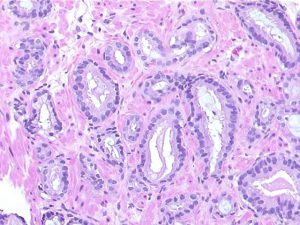 This post originally appeared on December 9, 2009. The post then received some criticism from pathologists about our role and position as healthcare providers. Many comments directed to me at the time felt I was violating the relationship the patient had with his physician. The relationship a patient has with his/her physicians should be one of trust and confidence in each other. Nothing I did would or should undermine this relationship. In fact, the patient’s physician pointed the patient to the elevator to my office with a name to ask for when he got off the elevator.
This post originally appeared on December 9, 2009. The post then received some criticism from pathologists about our role and position as healthcare providers. Many comments directed to me at the time felt I was violating the relationship the patient had with his physician. The relationship a patient has with his/her physicians should be one of trust and confidence in each other. Nothing I did would or should undermine this relationship. In fact, the patient’s physician pointed the patient to the elevator to my office with a name to ask for when he got off the elevator.
The fact of the matter is the patient had questions about his pathology report his physician could not answer so he was referred to me. The report subscribed to standardized reporting, terminology and staging information but his physician thought some of the patient’s questions would be best answered by someone other than him. Why or how would my reviewing the slides with the patient undermine the relationship between this patient and his physician? Admittedly, many of my colleagues are not as enthusiastic about reviewing slides with patients and/or their family members.
Pathologists have an obligation to the patient that may extend assuring best clinical practices and generating a report. It may require actually reviewing the report in the context of their slides and telling them “This is your cancer”.
Several months ago a gentleman walked into my office and introduced himself. The name sounded familiar but I couldn’t recall the context where I had read it or heard it before. Without mentioning how I could help him he mentioned that I had read his biopsy the week before and he would like to see his slides.
This happens about once a year each year I have been in practice. Sometimes they are physicians, sometimes not and occassionally they are pathologists. It makes no difference in reviewing their slides beyond some of the terms used or amount of histology they may or may not know. During the course of each of these encounters I seem to make the same statement – “This is your cancer”.
Whatever was said up to that point and perhaps in some cases after that statement, I find that patient’s get what they sought from the visit to “their” pathologist. While few have doubted the accuracy of the diagnosis, grading or staging of their disease, they want affirmation that what was read by the lab represented their biopsy and the pathologist confirmed that this cancer was their disease. In some cases I have come to learn that this may have been the first time a physician mentioned the word “cancer” to them since the biopsy. Inevitably, they also check the slide labels to confirm their name is on them to dispel any doubt they may still have about ensuring the slides belonging to them and the appropriate diagnosis for the appropriate patient.
Shortly after the patient sat down opposite me at the double headed microscope in my office and I began trying to recover his slides along with three office assistants, the same questions as in the past arose in my mind. Is this appropriate to be reviewing the slides with the patient? What if the slides cannot be found immediately to review in a timely fashion? What questions may arise and how will I address those?
These occurrences also remind me that every number is a life. Every accession number, order number and slide is a life. In the course of a large signout on any given day it may be easy to lose sight of that fact and patients become “accessions” or “cases”.
When patients come to your office, it affirms they are not a “case” or a “biopsy”.
This particular patient asked if I remembered his slides during the course of reading slides from the week prior. Was their anything unusual about his slides? Did I show his slides to anyone else?
At the time, I honestly could not recall. His was one of 50 or so “cases” that day. Nothing was out of the ordinary. I diagnosed several new malignancies that day including several of the same kind of tissue he had biopsied. Nothing was out of the ordinary with that particular group of slides or any particular patient’s sample that I could recall from a week ago.
Once we retrieved the slides from the file and surgical pathology report, I reviewed the patient’s slides with him and when getting to the appropriate focus told the patient “This is your cancer”.
A grateful patient thanked me for my time. While I may not have remembered the “case” at the time, this is one patient I will not forget.
Read more: https://tissuepathology.com/2009/12/09/this-is-your-cancer/#ixzz3DLTUotNG
Follow us: @tissuepathology on Twitter | pathology2.0 on Facebook

































